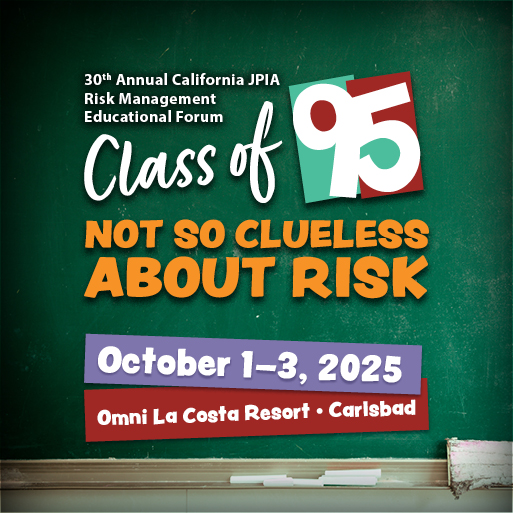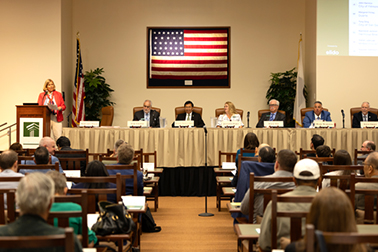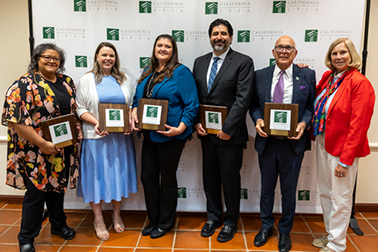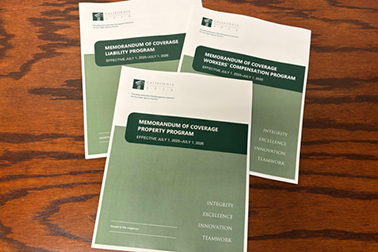Issue 161 - July 2025
NEWS: WORTHY

Featured Sessions at the 2025 Forum
The California JPIA’s Annual Risk Management Educational Forum, taking place at the Omni La Costa Resort in Carlsbad from October 1 through 3, 2025, offers Authority members two and a half days of learning facilitated by risk management experts. The sessions cover topics including public records requests, data breaches and cyber attacks, homelessness, abuse prevention, crisis communications, and liability case law.
Some sessions that may be of particular interest to members are:
Managing Complaints Made Against Local Officials
Take a dive into the real-world challenges of handling high-stakes investigations involving appointed and elected local officials with integrity and confidence. This session offers a clear, practical roadmap for conducting fair and thorough investigations—covering everything from fact-finding and interviews to maintaining discretion under pressure. Just as crucial, it tackles what comes next: how to communicate outcomes, restore trust, and turn challenging situations into opportunities for growth. Attendees will walk away with actionable strategies to lead with transparency and strengthen public confidence when it matters most.
Public Sector Incident Response—Minimizing Downtime and Maintaining Public Trust
A rapid response to a cyber incident is crucial for maintaining operations and public confidence. This session covers building an incident response team, essential communication strategies, and technical best practices to help municipalities recover quickly and securely.
Governing in Contentious Times
This interactive panel discussion will examine the increasingly contentious and high-stakes environment local government chief executives face and its implications for organizational risk. As public discourse becomes more polarized and external pressures intensify, agency leaders navigate complex dynamics that can expose agencies to reputational, operational, and even legal risk. This session will bring together experienced local government executives to explore real-world scenarios, identify emerging threats, and share practical strategies for mitigating risk while maintaining effective leadership. Attendees will gain insights into how proactive communication, internal alignment, and strong governance practices can help their organizations remain resilient, compliant, and mission-driven in challenging times.
Crime vs. Cyber—Understanding the Overlaps and Minimizing the Exposures
Cyberattacks can be financially devastating for local governments. This session explores how traditional crime concerns (e.g., theft, fraud, and embezzlement) overlap with modern cyber threats (like ransomware and data breaches), offering practical guidance for identifying vulnerabilities and implementing proactive safeguards. Attendees will learn essential strategies to mitigate risk, protect municipal assets, and foster resilience in a rapidly evolving threat landscape.
Securing Municipal Financial Systems—Preventing Fraud, Data Breaches, and Cyber Attacks
As local governments increasingly rely on digital financial systems, ensuring security against cyber threats and fraud is paramount. Experts will delve into the critical aspects of safeguarding financial infrastructures within municipalities. This session will explore the latest strategies, technologies, and best practices for protecting municipal financial data, maintaining public trust, and complying with regulatory standards.
Visit the Risk Management Educational Forum website page for more information or to register. Questions about the Forum can be directed to staff via email.
Print Article
California JPIA Selects 2025 Capstone Award Finalists
The California JPIA has selected five 2025 Capstone Award finalists for recognition at the 30th Annual Risk Management Educational Forum, October 1–3, at the Omni La Costa Resort in Carlsbad. The Authority presents the Capstone Award annually to an individual whose efforts promote risk management and minimize workplace exposure.
Congratulations to this year’s finalists!
-
-
- Dorna Farhadi, Human Resources Manager, City of Laguna Niguel
- Kristi Hobrecker, Director of Human Resources and Library Services, City of Santa Clarita
- Pam Kobylarz, Assistant to the Town Manager, Town of Mammoth Lakes
- Kevin McCarthy, Finance Director, City of Indian Wells
- Josephine Wilson, Assistant City Manager, City of Westlake Village
-
Nominated by colleagues from across the Authority’s member agencies, each finalist exemplifies the following criteria:
- Works to support or improve risk management within their agency
- Influences others in developing or maintaining positive risk management efforts in the work environment
- Coordinates support systems that serve the member’s risk management goals and needs
- Exhibits positive risk management
The California JPIA will honor one of these finalists as the Capstone Award recipient during a ceremony at the Forum on Thursday, October 2, 2025.
Print Article
2025 Annual Meeting of the Board of Directors
The California JPIA welcomed members to the Authority campus on Wednesday, July 23, for the 2025 Annual Meeting of the Board of Directors. A quorum of delegates representing 77 member agencies attended the meeting. The Board of Directors, the governing body of the California JPIA, consists of one elected official appointed by each of the 125 member agencies, including 100 cities, 18 joint powers authorities, and seven special districts.
Executive Committee President Margaret Finlay, representing the City of Duarte, welcomed delegates to the meeting. Representatives reelected Finlay as Executive Committee President. Steve Croft, City of Lakewood; Jennifer Perez, City of Norwalk; and Sonny Santa Ines, City of Bellflower, were also reelected to serve two-year terms as members of the Executive Committee.
Finlay recognized the winners of the 2025 Risk Management Awards. Chief Executive Officer Alex Smith then presented an operational overview and strategic plan, emphasizing coverage programs, member services, risk management resources, and the comprehensive training offerings provided to members. After Smith’s presentation, the meeting was adjourned until the next Board of Directors meeting on Wednesday, July 22, 2026.
Print ArticleRE: MEMBERS

Celebrating Excellence: Members Receive 2025 Risk Management Awards
Six Authority members received Risk Management Awards for demonstrating superior risk management practices at the July Board of Directors’ annual meeting.
The Authority’s Risk Management Awards recognize members who have demonstrated the best overall performance in the Liability and Workers’ Compensation programs. The winners are:
Liability Program
- Coachella Valley Association of Governments (Non-Municipal Agencies)
- City of Big Bear Lake (Municipal Agencies without Police Exposure)
- City of San Luis Obispo (Municipal Agencies with Police Exposure)
Workers’ Compensation Program
- Southern California Association of Governments (Non-Municipal Agencies)
- City of Calabasas (Municipal Agencies without Public Safety Exposure)
- City of Morro Bay (Municipal Agencies with Public Safety Exposure)
A committee of California JPIA staff evaluated various factors that reflect member risk management efforts, including overall claims performance, improvement in claims performance over time, responsiveness to Loss Control Action Plan (LossCAP) recommendations, participation in the Authority’s loss control programs, and attendance at training and academy opportunities.
“The Risk Management Awards reflect the power of strong governance and leadership,” said California JPIA Chief Executive Officer Alexander Smith. “I am honored to celebrate this year’s award recipients. Their commitment to excellence in risk management sets a standard for our entire membership and public agencies throughout the state.”
Congratulations to the 2025 Risk Management Award Winners!
Print ArticleCOVERAGE MATTERS

2025–26 Memoranda of Coverage and Program Certificates
Throughout each coverage period, staff evaluates the Authority’s Memoranda of Coverage (MOC) for sections that should be considered for clarification, amendment, or change. These changes accomplish the goal of providing an easy-to-follow coverage document for the Authority’s membership.
On June 25, 2025, the California JPIA Executive Committee approved revisions to the following Memoranda of Coverage:
Memorandum of Coverage—Liability Program
Pages 6–16—Definitions: Definitions were added for the terms Annual Aggregate Deductible, Earth Movement, Endorsement, Member Retained Limit, Protection Limit, and Sublimit. Some of these terms had been previously used, but did not necessitate definition, while others are new to the document and are significant enough that they required definition.
Page 20—Exclusion P: The exclusion was amended to clarify that the approval or disapproval of land use regulations is both discretionary and non-discretionary. It has also been clarified that the approval or disapproval of ordinances includes any licensing issues, and also includes massage parlors.
Endorsement 2: After considerable consultation with the Managers Committee and the Executive Committee, a Sublimit on coverage for Earth Movement-related claims was adopted. This necessitated creating a new endorsement to the Primary Liability portion of the MOC. The Endorsement sets forth limits of $10M, per member, per coverage period and a pool-wide limit of $30M per coverage period, to be shared by all members, if necessary. These limits are regardless of the number of claims filed.
Endorsement 2 was previously utilized to list the Excess Liability Program members and their corresponding Member Retained Limits. We have moved that information to the newly formed Endorsement 3.
Endorsement 3 was amended to reflect that Pacific Grove and San Luis Obispo have increased their Member Retained Limits from $150,000 to $200,000 and $500,000 to $1,000,000, respectively.
Memorandum of Coverage—Workers’ Compensation Program
Page 6: Workers’ compensation coverage is now extended to paid and unpaid interns.
Memorandum of Coverage—Property Program
Page 4: “All Risk” deductible has increased from $10,000 to $15,000 for all perils and property including fire and ambulance vehicles and vehicles on the premises and boats.
Page 58: Terrorism limit has increased from $100,000,000 to $150,000,000.
Program summaries for the 2025–26 coverage period will be updated and provided to members in the coming weeks.
Your agency’s personalized Memoranda of Coverage and Program Certificates for 2025–26 are available for download. Member employees can go to cjpia.org, hover over Coverage, and then either click on Memoranda of Coverage or Program Certificates. Log in, and you will land on your agency’s organization page in our member portal and have access to this year’s documents.
If you have forgotten or require myJPIA credentials, please use the features found on the myJPIA login page to register or reset your password. Your username is your email address.
If you have any questions about coverage-related issues, please contact the appropriate program manager: Paul Zeglovitch, claims and insurance director; Jeff Rush, workers’ compensation program manager; or Christopher Gray, insurance programs manager.
Print ArticleLEGAL MATTERS

Public Law Update – AB 1785 Revises the California Public Records Act to Further Protect Officials’ Personal Information
By Elena Q. Gerli, Partner, Burke, Williams & Sorensen, LLP
Originally published on June 4, 2025. Republished with permission from Burke, Williams & Sorensen, LLP.
Assembly Bill 1785 (AB 1785) amended Government Code Section 7928.205, relating to public records. The California Public Records Act is codified as Sections 7920.000 to 7931.000 of the Government Code.
AB 1785 became effective on January 1, 2025 and amends section 7928.205 which prohibited posting of an elected or appointed official’s home address and phone number. The bill amended this section to specify that “no state or local agency shall publicly post the home address, telephone number, or both the name and assessor parcel number associated with the home address of any elected or appointed official on the internet without first obtaining the written permission of that individual.” AB 1785 specifies that “publicly post” means “to intentionally communicate or otherwise make available the information described in subdivision (a) on the internet in an unrestricted and publicly available manner.” The exemption does not apply to legally required notices.
AB 1785 also added findings to clarify the intent of the exemption, “to protect the personal safety and privacy of public officials and their families by limiting access to assessor’s parcel numbers in connection with the home address of those individuals.” The Legislature further clarified that the intent of the revised Section 7928.205 is not to limit access to “recorded documents, indices, and assessor data through electronic means by business entities,” and does not require databases that provide public access to such documents to be taken down, but ensures that a public official’s home address cannot be obtained through accessing publicly recorded documents.
Burke, Williams & Sorensen, LLP regularly advises clients on legal matters relating to the Public Records Act.
All materials have been prepared for general information purposes only to permit you to learn more about our firm, our services and the experience of our attorneys. The information presented is not legal advice, is not to be acted on as such, may not be current and is subject to change without notice.
Print Article
California Employers Should Review Their Cellular Phone and Driving Policies Following Recent Court of Appeal Decision
By Jennifer S. Grock, Partner, and Jonathan Judge, Partner, Atkinson, Andelson, Loya, Ruud & Romo
Originally published on July 14, 2025. Reprinted with permission from Republished with permission from Atkinson, Andelson, Loya, Ruud & Romo.
California employers are encouraged to review their cellular phone and driving policies in light of a recent Court of Appeal decision which bars drivers from using any functions on a handheld cellular phone while driving. People v. Porter, 111 Cal. App. 5th 927, 333 Cal. Rptr. 3d 168, 171 (2025).
On June 3, 2025, the California Court of Appeal issued a ruling in Porter, which reinstated the traffic conviction of a driver who had viewed a mapping application on his cellular phone while holding the phone and driving. The defendant, Nathaniel Gabriel Porter, who was convicted of violating Vehicle Code section 23123.5(a) – which prohibits drivers from “holding and operating” a handheld cellular phone unless it is used in a manner that allows voice-operated and hands-free operation – appealed his traffic conviction to the appellate division of the Santa Clara Superior Court. Porter argued that the statute prohibited only listening and talking on a handheld phone. The appellate division agreed and reversed the conviction, concluding that “operating” a cellular phone under the statute requires active use or manipulation of the device, such as talking, listening, emailing, or otherwise engaging with the phone, rather than simply observing GPS directions. The Court of Appeal then reviewed the case, ultimately reinstating Porter’s conviction.
The court’s ruling concluded the statute prohibits all use of a cellular phone’s functions while driving and holding the phone, including passively looking at an application on the phone. The Legislature intended to curb distracted driving stemming from the expanded functionality of modern phones by banning all use of a phone’s functions while held in the hand. Further, the court reasoned that Porter’s use of his handheld cellular phone while driving implicated safety concerns. Under Porter’s interpretation of the statute, the court opined that a driver could not only view a mapping application, but also watch a video or other similarly dangerous, distracting activities, while driving. The court decided that Vehicle Code section 23123.5(a) was correctly interpreted as barring drivers from using any application or function on a cellular phone while holding the phone and driving.
Given this ruling, California employers should consider if any updates are necessary to their employment policies. While many employers may already have policies in place which require hands-free cellular phones to make and receive calls while driving, the Porter case holds that any use of a cellular phone violates the law when holding the phone and driving. Employers may need to review their policies to ensure the policy bars employees who are driving for work purposes from engaging in any use of a handheld phone and to suggest alternatives such as a cellular phone windshield mount so that drivers can observe mapping applications if necessary.
Employers with questions about their cellular phone, driving, and other employment policies may contact the authors of this post or their usual counsel at AALRR.
This AALRR publication is intended for informational purposes only and should not be relied upon in reaching a conclusion in a particular area of law. Applicability of the legal principles discussed may differ substantially in individual situations. Receipt of this or any other AALRR publication does not create an attorney-client relationship. The Firm is not responsible for inadvertent errors that may occur in the publishing process.
Print Article
